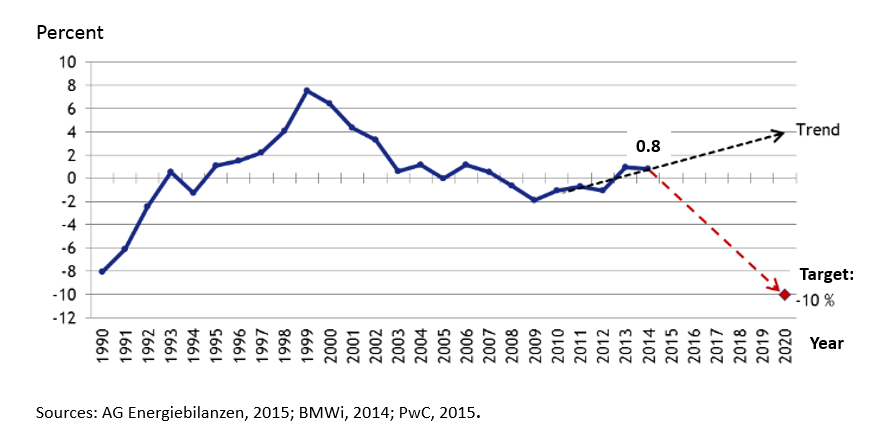In the media: German transport sector set to miss climate targets
Frankfurter Allgemeine Zeitung
“EU considers penalties for excessive CO2 emissions”
The EU Commission is considering the introduction of binding regional climate targets for the development of renewables and decreasing energy consumption, Hendrik Kafsack and Andreas Mihm write in the Frankfurter Allgemeine Zeitung (FAZ). A group of countries, including Germany, Belgium, the Netherlands, Luxembourg and Austria, would then have to increase the share of renewable energies to an average value set by the commission. But this could mean that Germany, which has its own ambitious goals for renewable development and energy efficiency, could fulfil the whole region’s targets on its own, while the other countries could stop their efforts, the authors write. Another option would be that states which fail to reach certain goals are obliged to pay penalties to those which contribute more than the average to the climate targets.
In a separate opinion piece for the FAZ, Hendrik Kafsack says that it should not matter how countries reduce their emissions. He also claims the commission would be wrong to push for binding climate targets. There was no need for the EU to fear it was not looking ambitious enough ahead of the Paris climate conference. “The EU is on the right way.”
Read the article in German here.
dpa-AFX / Green Budget Germany
“Green Party: German government will miss some of its climate targets”
The German government will miss its climate targets for the transport and heating sector, an analysis by Green Budget Germany (FÖS) commissioned by the Green Party shows. The share of renewables in the transport sector decreased in the first half of 2015 to 5.1 percent - a long way off the target of ten percent by 2020, the researchers point out. Final energy consumption in the transport sector is supposed to decrease by ten percent by 2020 compared to 2005 – but by last year it had increased by 0.8 percent. Primary energy consumption, which by 2020 should drop by 20 percent compared to 2008, has fallen only by 6.4 percent so far. If the government does not reverse these trends, it will fail to achieve its climate targets, Green Party energy politician Julia Verlinden told dpa.
Read the FÖS study in German here.
Der Spiegel
“Brussels doom?”
The Ministry for Economic Affairs and Energy is currently evaluating whether its planned coal power reserve for old lignite plants is in breach of EU state aid rules, Der Spiegel reports. The ministry previously said that it did not have any doubt that the millions of euros in compensation for utilities which transfer their power plants into the reserve would agree with EU rules. “Now the government doesn’t seem to believe itself anymore that the coal reserve is legitimate,” Der Spiegel quotes Green Party MP Oliver Krischer as saying. The ministry is discussing the issue with the EU Commission.
Reuters/Handelsblatt
Bilfinger to cut 750 jobs in power plant division
German construction company Bilfinger will shed 750 jobs in its power plant division, which is for sale, reports Reuters. Bilfinger decided to sell the business because almost no new power stations are being built in Germany due to the Energiewende, according to the report. The company employs 11,000 people in the division and confirmed the new plans for job cuts, which were first leaked by the unions. Bilfinger last year reduced the number of employees in the unit.
Read the report in German here.


